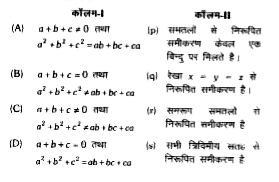किसी धनात्मक पूर्णांक n के लिये, यदि fn(θ)=(tan.θ2)(1+secθ)(1+sec2θ)(1+sec4θ)...(1+sec2nθ) तो
f2(π16)=1
f3(π32)=1
f4(π64)=1
f5(π128)=1
The correct Answer is:A, B, C, D
Step by step video, text & image solution for किसी धनात्मक पूर्णांक n के लिये, यदि f_(n)(theta)=(tan.(theta)/(2))(1+sectheta)(1+sec2theta)(1+sec4theta)...(1+sec2^(n)theta) तो by Maths experts to help you in doubts & scoring excellent marks in Class 12 exams.
Updated on:21/07/2023Topper's Solved these Questions
- त्रिकोणमितीय अनुपात, फलन एवं सर्वसमिकायेBOOK - ERRORLESS HINDICHAPTER - त्रिकोणमितीय अनुपात, फलन एवं सर्वसमिकायेEXERCISE - JEE Advanced (Reasoning type questions)
1 Videos
- त्रिकोणमितीय अनुपात, फलन एवं सर्वसमिकायेBOOK - ERRORLESS HINDICHAPTER - त्रिकोणमितीय अनुपात, फलन एवं सर्वसमिकायेEXERCISE - JEE Advanced (Comprehension type questons)
3 Videos
- त्रिकोणमितीय अनुपात, फलन एवं सर्वसमिकायेBOOK - ERRORLESS HINDICHAPTER - त्रिकोणमितीय अनुपात, फलन एवं सर्वसमिकायेEXERCISE - Exercise
104 Videos
- त्रिकोणमितीय समीकरण एवं असमिकाएँ त्रिभुजों के गुण उँचाई एवं दुरी BOOK - ERRORLESS HINDICHAPTER - त्रिकोणमितीय समीकरण एवं असमिकाएँ त्रिभुजों के गुण उँचाई एवं दुरी EXERCISE - JEE Advanced
47 Videos
- त्रिविमीय निर्देशांक ज्यामिति BOOK - ERRORLESS HINDICHAPTER - त्रिविमीय निर्देशांक ज्यामिति EXERCISE - JEE ADVANCED (Matrix Match type questions)
4 Videos
Similar Questions
माना कि α,β,γ>0 तथा α+β+γ=π2 है।
कथन-1 : ∣∣∣tanαtanβ−a!6∣∣∣+∣∣∣tanβtanγ−b!2∣∣∣+∣∣∣tanγtanα−c!3∣∣∣≤0 जहाँ n≠1.2….n, तब, tanαtanβ,tanβtanγ,tanγtanα स.श्रे. में है।
कथन-2 : tanαtanβ+tanβtanγ+tanγtanα=1
View Solutionदिया गया है। cos2mθcos2m+1θ...cos2nθ=sin2n+1θ2n−m+1sin2mθ जहाँ 2mθ≠kπ,n,m,kεI निम्न को हल करें।
sin9π/14sin11π/14sin13π/14 बराबर है
View Solutionयदि tan2αtan2β+tan2βtan2γ+tan2γtan2α+2tan2αtan2βtan2γ=1 तब sin2α+sin2β+sin2γ का मान है
View Solution0<θ<π2 के लिए 6Σm=1cosec(θ+(m−1)π4)cosec(θ+mπ4)=4√2 का के हल निम्न है।
View Solutionमाना निम्न रैखिक समीकरण है ax+by+cz=0,bx+cy+oz=0,cx+ay+bz=0 कॉलम । में दी गयी स्थितियों/व्यंजकों का कॉलम ॥ में दिए गए वक्तव्यों से सुमेल करें

View SolutionProve that: (1+sec2θ)(1+sec4θ)(1+sec8θ)(1+sec2nθ)=tan2nθcotθ,n∈N.
View Solutionf_(n)(Theta)=(tan((Theta)/(2)))(1+sec(Theta))(1+sec(2Theta))......(1+sec(2^(n)Theta)
View SolutionFor a positive integer n f_(n)(theta)=((tan theta)/(2))(1+sec theta)(1+sec2 theta)(1+sec4 theta)...(1+sec2^(n)theta) ,then
View SolutionThe value of tan((theta)/(2))(1+sec theta)(1+sec2 theta)+(1+sec2^(2)theta)...(1+sec2^(n)theta) is
View Solutionconsider f_(n)(theta)=(2cos theta-1)(2cos2 theta-1)(2cos(2^(2)theta)-1)....(2cos(2^(n)theta)-1) the value of f_(n)(theta) is equal to
View Solution((1+i tan theta)/(1-i tan theta))^(n)-(1+i tan n theta)/(1-i tan n theta)=
View Solutionf(n,theta)=(1+sec2 theta)(1+sec2^(2)theta)...(1+sec2^(n)theta) then f(1,(pi)/(6)) and f(2,(pi)/(12))=
View SolutionIf : secθ⋅tanθ(secθ+tanθ)+(secθ−tanθ)=secnθ+tannθ,then:n= A)1 B)2 C)3 D)4
View SolutionProve that ,(1+sec2θ)(1+sec22θ)(1+sec23θ)...(1+sec22θ)=tan2nθtanθ
View Solutionएक धन पूर्णांक n के लिए माना
fn(θ)=(tan.θ2)(1+secθ)(1+sec2θ)(1+sec4θ)...(1+sec2nθ), तब
View Solution
